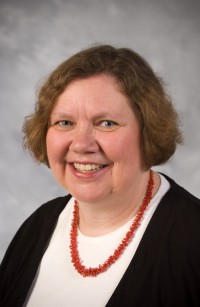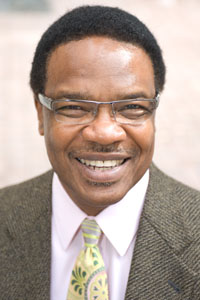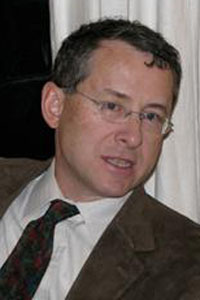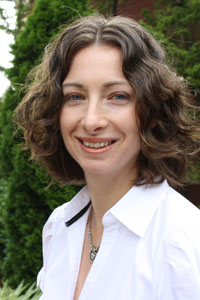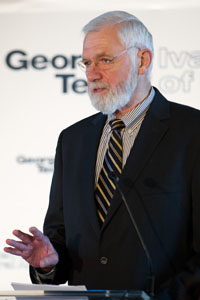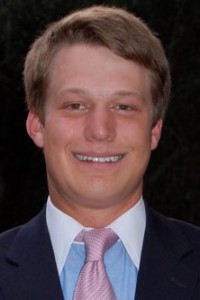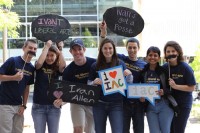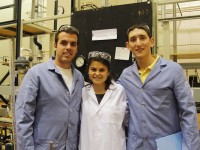Sponsored Research
Gordon Kingsley has been awarded $391,443 by the Georgia Department of Transportation for the project "Implementing Communities of Practice in the Georgia Department of Transportation."
Books by Faculty
Alien Phenomenology, or What It’s Like to Be a Thing (University of Minnesota Press) by Ian Bogost, professor and director of Graduate Studies in Digital Media, School of Literature, Communication, and Culture. Bogost develops an object-oriented ontology that puts things at the center of being—a philosophy in which humans are elements, but not the sole, or even primary elements of philosophical interest.
Adversarial Design (MIT Press) by Carl DiSalvo, assistant professior of digital media in the School of Literature, Communication, and Culture. DiSalvo examines the ways that technology design can provoke and engage the political. He describes a practice that is not simply applying design to politics--attempting to improve governance for example, by redesigning ballots and polling places; it is implicitly contestational and strives to question conventional approaches to political issues.
What Does Georgia Tech Think?
Selected Press for Ivan Allen College of Liberal Arts
|
|
Cozzens Named Vice Provost of Graduate Education and Faculty Affairs
|
|
Following a leadership reorganization of the Office of the Provost last December, two new vice provost positions emerged to serve the various populations of Georgia Tech in their academic endeavors. This summer, Susan Cozzens will assume one of those roles as the Institute’s first vice provost for graduate education and faculty affairs. “The position involves advocacy for three groups I have been committed to for a long time: faculty, graduate students and postdoctoral scholars,” Cozzens said. “The special opportunity at this time is to create a new vision for graduate education, which is the projected growth area for the Institute.” Cozzens comes from the Ivan Allen College of Liberal Arts, where she is associate dean for research and faculty development, a professor in the School of Public Policy and director of the Technology Policy Assessment Center. She previously served as chair of the School of Public Policy, in various roles at Rensselaer Polytechnic Institute and as director of the National Science Foundation’s Office of Policy Support. "Susan has been a strong advocate for faculty and graduate students throughout her career, and understands the issues, policies and opportunities related our students, faculty and postdoctoral researchers," said Rafael Bras, provost and executive vice president for academic affairs. "This experience will be invaluable in developing a focused approach that enables us to make the appropriate investments in these groups." Cozzens will exit her role as associate dean and reduce her teaching workload but maintain advisement of doctoral students and current research involvement, including an NSF-supported endeavor focused on women in U.S. science policy. “I am particularly looking forward to working with the great team in the Office of the Provost, who are full of vision and energy and are leading us towards a whole new Georgia Tech for the 21st century,” she said. Among Cozzens’ new duties will be overseeing and coordinating faculty hiring and career progression, postdoc initiatives and career planning, and graduate student admission processes and policies — all with the goal of attracting and retaining the best faculty, graduate students and postdoctoral fellows. Ray Vito, vice provost for graduate and undergraduate studies, has served as interim in the graduate education and faculty affairs role since December. Cozzens will officially take over June 1. |
Joseph R. Bankoff Named Chair of The Sam Nunn School of International Affairs
Joseph R. Bankoff, president and CEO of the Woodruff Arts Center in Atlanta, has been named chair of The Sam Nunn School of International Affairs and professor of the practice in the Ivan Allen College of Liberal Arts.
“We are especially privileged to have Mr. Bankoff assume leadership of The Sam Nunn School of International Affairs at a time when we are shaping a new strategic plan for its future,” said Jacqueline J. Royster, dean of the Ivan Allen College of Liberal Arts. “Mr. Bankoff’s engagement in the Institute’s long-range strategic planning process, his linkages throughout Atlanta and around the world, and his commitment to our trusteeship of the legacy of Mayor Ivan Allen, Jr. will enhance and enlarge the school’s momentum in education and research integrating technology and international affairs."
Mr. Bankoff’s experience ranges across law and policy, economic development, government legislation, fiscal planning, and global issues. He has been involved with The Nunn School’s Sam Nunn Bank of America Policy Forum since its inception.
Senator Sam Nunn who is distinguished professor in The Nunn School said, “Joe Bankoff is known and respected in broad and influential circles in Atlanta and Georgia for his integrity, his visionary leadership, his keen intellect, his common sense, his good judgment, and his dedication to civic improvement."
Mr. Bankoff has led the Woodruff Arts Center, one of the nation’s four largest performing arts centers, for six years. He spearheaded development of a comprehensive strategic plan encompassing the center’s four units, a new governance structure, physical campus, and arts education outreach, and has been influential in the growth of Midtown Atlanta. He will retire from Woodruff at the end of May and will begin at Georgia Tech in September.
“I am flattered and excited to have the opportunity to work with the distinguished faculty and impressive students at The Sam Nunn School of International Affairs,” said Mr. Bankoff. “I have been privileged to work within Georgia Tech in various volunteer roles for more than a decade. I believe that The Nunn School and the Ivan Allen College of Liberal Arts have the potential to greatly strengthen the capacity of Georgia Tech to provide and produce culturally aware and technically competent leadership in both global technology and policy.”
Mr. Bankoff was a senior partner for many years at King & Spalding, LLP where he founded the firm’s Intellectual Property Practice Group. He was a trial lawyer for twenty-five years working in the arena of technology and communication disputes and contracts and with litigation experience in patent, copyright, trade secret, media and technology-related matters.
During his legal career, Mr. Bankoff was continuously recognized as one of Atlanta’s top lawyers, was selected by Chambers USA as a leading lawyer in his practice area, and as one of “The Best Lawyers in America.” He has served on the Governor’s Telecommunications and Technology Task Force and recently led an Advisory Committee to the Georgia Joint House-Senate Committee on Emerging Communications Technologies, drafting legislation that was adopted. As Television Counsel to the Atlanta Committee for the Olympic Games (ACOG) he negotiated television rights agreements for the 1996 Olympic Games in the United States, Canada, Europe, Australia, Latin and South America.
Mr. Bankoff received a B.S. in Industrial Management from Purdue University. He earned his J.D. from the University of Illinois. In 1992, he was a visiting scholar at the Max Planck Institute for Foreign and International Patent, Copyright and Competition Law in Munich, Germany.
Read Mr.Bankoff’s January 2010 address to the Institute on its strategic plan
|
Boston Proposes National Commission on Black Employment to White House
|
|
Robust economic recovery and job training programs won’t solve the employment problems of African Americans said School of Economics Professor Thomas “Danny” Boston during a meeting held by President Obama’s Council of Economic Advisers at a White House meeting April 11. Boston recommended that, to truly resolve the issues, the White House establish a National Commission on Black Employment. “The challenges are deep-seated and multifaceted. Therefore, incremental policy changes such as job training programs are important, but are not likely to make any significant difference,” said Boston during the Council meeting. “As such, I propose that the Administration create a National Commission on Black Employment in the same manner in which national commissions were created to address the 'great recession' and the bankruptcy of the auto industry.” Boston was one of a key group of economists and academics invited to the White House Council of Economic Advisers meeting, “African Americans, Jobs, and the Economy,” to provide input on the uniqueness of the recent financial crisis, how African Americans are faring in the recovery, and immediate- and long-run policy recommendations, especially with respect to the labor and housing market. Boston cited research indicating that blacks have been heavily burdened by the economic crisis. For example: unemployment rates reached their highest post-recession levels in October 2010 at 16.7% for blacks compared to 9.3% for whites. During the current economic recovery, the general unemployment rate is 8.2%, but the rate among blacks is 14.0% compared to 7 .3% among whites. Worse still, he said, black teenage unemployment is 40.5%. Blacks are about twice as likely to be unemployed as are whites, but the most onerous burden, said Boston, is that blacks make up 11.9% of the workforce but constitute 20.4% of all unemployed workers. Boston pushed the discussion beyond the nation’s current economic struggles showing that, even when the economy is doing well, black unemployment is still very high. As an example, Boston cited the December 2007 peak in the business cycle when the unemployment rate for whites was 4.4%, but the rate for blacks was more than double that at 9.0%. In fact, the best quarter of economic performance in the last decade occurred in the fourth quarter of 2003 during which GDP grew at 6.7%. However, the unemployment rate for blacks averaged 10.6% during that quarter. “Clearly, economic growth alone is not sufficient to reduce the disproportionately high rate of black unemployment to levels that are experienced by whites,” said Boston. “In fact, there is no scenario wherein the economy can grow robustly enough to reduce black unemployment to reasonable levels. Therefore, growth is important but it is not enough.”
A Multifaceted, Concerted Effort is needed to Address Black Unemployment In calling for the White House to establish a National Commission on Black Employment, Boston said that such a commission could identify the most appropriate policy solutions “for dealing with the multifaceted problems that have contributed to the large racial disparity in employment.” “The challenges of unemployment experienced by blacks are deep-seated,” he said. “Some causes are rooted in the country’s history of racial discrimination, while others have to do with the contemporary effects of globalization and de-industrialization.” His quick summary of factors contributing to high black unemployment included: - Disadvantages in the occupational distribution of jobs among blacks (maximal concentrated in low-paying occupations that are sensitive to changes in business cycle activity)
- A greater concentration of blacks in urban areas where unemployment is higher
- Lower rates of educational attainment
- Extreme wealth inequality (inequality exists between blacks and whites and it is growing within the black community)
- High rates of black incarceration (the criminal records of males and, increasingly, females lowers the probability of becoming employed)
- A poorly functioning and unresponsive public educational system especially in large urban areas
- A spatial mismatch between the location of jobs in metropolitan areas in the communities where blacks are concentrated
A professor of Economics in the Ivan Allen College of Liberal Arts School of Economics, Thomas “Danny” Boston publishes the Gazelle Index, the first-ever national quarterly survey of the current conditions, level of optimism, and hiring plans of small businesses that also focuses on minority and women-owned businesses. He is also founder and CEO of EuQuant. |
Assessing the Economic Impact of Nanotechnology on Green and Sustainable Growth
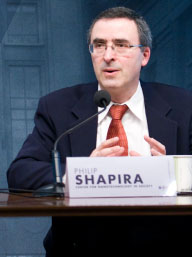
Georgia Tech's Philip Shapira and Jan Youtie helped answer that question through research presented March 27th at the International Symposium on Assessing the Economic Impact of Nanotechnology held in Washington, D.C.
Understanding Lifecycle Issues is Important to Assessing Impact
Shapira and Youtie highlighted the importance of full lifecycle assessments to understand the impacts of nanotechnologies on green economic development in such areas as energy, the environment, and safe drinking water.
“Nanotechnology promises to foster green and sustainable growth in many product and process areas,” said Shapira, a professor in IAC's School of Public Policy and the Manchester Institute of Innovation Research at the Manchester Business School in the United Kingdom. “Although nanotechnology commercialization is still in its early phases, we need now to get a better sense of what markets will grow and how new nanotechnology products will impact sustainability. This includes balancing gains in efficiency and performance against the net energy, environmental, carbon, and other costs associated with the production, use and end-of-life disposal or recycling of nanotechnology products.”
But because nanotechnology underlies many different industries, assessing and forecasting its impact won’t be easy. “Compared to information technology and biotechnology, for example, nanotechnology has more of the characteristics of a general technology such as the development of electric power,” said Youtie, director of policy research services at Georgia Tech’s Enterprise Innovation Institute. “That makes it difficult to analyze the value of products and processes that are enabled by the technology. We hope that our paper will provide background information and help frame the discussion about making those assessments.”
The symposium was sponsored by the Organization for Economic Cooperation and Development and by the U.S. National Nanotechnology Initiative. Support for Georgia Tech research into the societal impacts of nanotechnology has come from the National Science Foundation through the Center for Nanotechnology in Society based at Arizona State University.
For their paper, co-authors Shapira and Youtie examined a subset of green nanotechnologies that aim to enable sustainable energy, improve environmental quality, and provide healthy drinking water for areas of the world that lack it. They argue that the lifecycle of nanotechnology products must be included in the assessment.
“In examining the economic impact of these green nanotechnologies, we have to consider the lifecycle, which includes such issues as environmental health and safety, as well as the amount of energy required to produce materials such as carbon nanotubes,” said Shapira.
Environmental concerns have been raised about what happens to nanomaterials when they get into water supplies, he noted. In addition, some nanostructures use toxic elements such as cadmium. Energy required for producing nano-enabled products is also an important consideration, though it may be balanced against the energy saved – and pollution reduced – through the use of such products, Shapira said.

Research into these societal issues, which is being conducted in parallel with the research and development of nanotechnology – may allow the resulting nano-enabled products to avoid the kinds of the controversies that have hindered earlier technologies.
“Scientists, policy-makers and other observers have found that some of the promise of prior rounds of technology was limited by not anticipating and considering societal concerns prior to the introduction of new products,” Youtie said. “For nanotechnology, it is vital that these issues are being considered even during the research and development stage, before products hit the market in significant quantities.”
The nanotechnology industry began with large companies that had the resources to invest in research and development. But that is now changing, Youtie said.
"A lot of small companies are involved in novel nanomaterials development,” she said. “Large companies often focus on integrating those nanomaterials into existing products or processes.”
Among the goals of the OECD symposium are development of methodologies and approaches for estimating the impacts of green nanotechnology on jobs and new product sales. Existing forecasts have come largely from proprietary models used by private-sector firms.
“While these private forecasts have high visibility, their information and methods are often proprietary,” Shapira noted. “We also need to develop open and peer-reviewed models in which approaches are transparent and everyone can see the methods and assumptions used.”
In their paper, Youtie and Shapira cite several examples of green nanotechnology, discuss the potential impacts of the technology, and review forecasts that have been made. Examples of green nanotechnology they cite include:
- Nano-enabled solar cells that use lower-cost organic materials, as opposed to current photovoltaic technologies that require rare materials such as platinum
- Nanogenerators that use piezoelectric materials such as zinc oxide nanowires to convert human movement into energy
- Energy storage applications in which nanotechnology materials improve existing batteries and nano-enabled fuel cells
- Thermal energy applications, such as nano-enabled insulation
- Fuel catalysis in which nanoparticles improve the production and refining of fuels and reduce emissions from automobiles
- Technologies used to provide safe drinking water through improved water treatment, desalination and reuse
|
Klein Appointed to U.S. Department of Transportation Intelligent Transportation Systems Committee
|
|
Hans Klein, an associate professor in the School of Public Policy, has been appointed by U.S. Secretary of Transportation Ray LaHood to the Intelligent Transportation Systems Program Advisory Committee (ITS PAC). The committee is charged with reviewing areas of ITS research being pursued by the U.S. Department of Transportation and providing advice on policy matters related to the ITS program. Klein’s research focuses on the interplay of institutions and information technology, especially in the areas of Internet governance and Intelligent Transportation Systems (ITS) development. In his ITS research, Dr. Klein has studied how the pre-existing institutions of the transportation sector (such as the ecology of Federal agencies and the division of responsibilities between Federal and State agencies) both helped to launch the ITS program and created barriers to rapid deployment. Currently, Dr. Klein is especially interested in how Federal agencies can facilitate private sector entrepreneurship that unlocks information-based value in the transportation sector. |
Flamming Receives Guggenheim Fellowship and Geoffrey Eichholz Teaching Award
|
|
Douglas Flamming, professor in the Ivan Allen College School of History, Technology, and Society has been honored with two prestigious awards that recognize his prowess in both scholarship and in teaching. The John Simon Guggenheim Memorial Foundation named Flamming a 2012 Fellow in support of his research on his fourth book, “Law of Promise: the Civil Rights Act of 1964.” “This Act transformed American society and politics,” observes Flamming. “Its foremost goal was to destroy Jim Crow racism in all walks of life. In addition, it outlawed discrimination against women in the workplace.” “I intend the book to be a study of democracy in action. The narrative will focus on Congress and the passage of the Act, highlighting the pressures from all directions – civil rights protests, constituents, and the White House. My challenge – and my opportunity -- will be to recreate the 88th Congress without losing sight of the fire hoses and attack dogs in Birmingham, without losing sight of Lyndon Johnson’s towering ambitions, without losing the voices of ordinary constituents across the country. My hope is that both scholars and general readers will see this transformative moment in a new light.” Flamming is an internationally recognized historian who has published multiple prize-winning books and already earned some of the most prestigious fellowships available to scholars in the liberal arts. The Guggenheim Fellowship places him among an impressive cadre of scholars who have “added to the educational, literary, artistic, and scientific power of the U.S and the cause of better international understanding.” Flamming's Award-Winning Undergraduate Teaching Flamming was also recognized this month with Georgia Tech’s Geoffrey Eichholz Teaching Award. The award is given annually by the Center for the Enhancement of Teaching and Learning (CETL) to two faculty members who excel in their teaching of foundation courses (freshman and sophomore courses) at Georgia Tech. “Doug is the epitome of a scholar-teacher,” said HTS Chair Steve Usselman, who noted that Flamming’s classes - which are not required - are always full to capacity. “He is an enormously creative and daring instructor of undergraduates. His appeal springs from his generous spirit, which finds expression in his steady devotion to the craft of teaching -- above all, to cultivating and utilizing the power of the spoken word. Doug commands the room through his command of language. His lectures are the stuff of legend; they are the sorts of experiences that stick with people for a lifetime.” Rather than presenting a conventional survey of major events that students could glean from a text, Flamming’s courses are an extended exploration of the idea of freedom in the U.S. since the Civil War. “How, he asks, have various groups and individuals perceived themselves to be growing more, or less, free?” Flamming's devotion to working through that enormously complex issue with hundreds of undergraduates each semester led him to rewrite one of his scholarly books from scratch. He wanted his work to speak more effectively to questions that had come to him from his students. “His commitment to teaching, far from interfering with his research, infused his scholarship with new meaning and significance,” said Usselman. The Guggenheim Fellowship speaks clearly for Dr. Flamming’s scholarship. A recent graduate of the Honors Program offered simpler praise when asked what advice she had for incoming students: “Take a class from Dr. Flamming.” Flamming was the recipient of the ANAK award, the Course Instructor Opinion Survey (CIOS) Teaching Excellence Award in 2010-21011 and the Donald H. Pflueger Local History Award in 2006-2007. Read more about Doug Flamming. |
Breznitz Awarded Fellowship at University of Turino
|
|
Public Policy Assistant Professor Shiri Breznitz will be visiting professor at the University of Turino in Italy for the 2012-2013 academic year. She was awarded a competitive fellowship from the Collegio Carlo Alberto in collaboration with the university. Breznitz will be researching the definition of clusters, in particular, she will collaborate with colleagues from around the world to conduct multiple case studies of industrial clusters in Italy, Spain, Switzerland, and the UK. Breznitz was also awarded, but declined, a visiting fellowship at the Said Business School in Oxford. |
Allen Prize Recipient William Foege to Receive Presidential Medal of Freedom
|
|
William H. Foege, who was honored by Georgia Tech in March with the Ivan Allen Jr. Prize for Social Courage, has been named by President Obama as a recipient of the Presidential Medal of Freedom. A transformational leader in global health policies who made possible the eradication of smallpox and other diseases worldwide, Dr. Foege was honored during events at the Institute’s Ivan Allen College of Liberal Arts on March 14-15, 2012. Foege is one of thirteen recipients of the Presidential Medal of Freedom announced by President Obama April 26th. The Medal of Freedom is the nation’s highest civilian honor, presented to individuals who have made especially meritorious contributions to the security or national interests of the United States, to world peace, or to cultural or other significant public or private endeavors. The awards will be presented at the White House in late spring.
|
What is the significance of Bin Laden's death? Who is impacted by Georgia's new tax laws? Are North Korean nukes next?
IAC professors are posting their insights on the Amplifier, Georgia Tech's new current issues blog. Check out recent posts: Dr. Larry Rubin (INTA) on the historical significance of Osama Bin Laden's death; Dr.Chris Ries (ECON) on how Georgia's new tax law will impact everyone; Dr. Margaret Kosal (INTA) on the implications of North Korea's failed missle test.
|
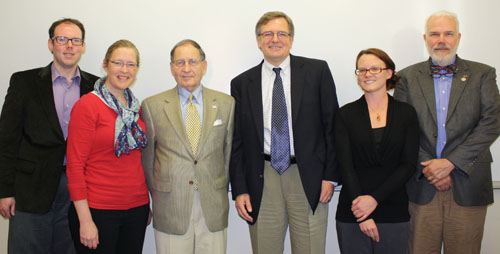
|
Homer Rice Visits HTS Scholarship Students
Homer Rice, the legendary former Georgia Tech Athletic Director and long-time Tech supporter, visited the School of History, Technology, and Society on April 4th. Dr. Rice met with doctoral students who have recently benefited from the Homer Rice Graduate Student Scholarship Award. The scholarship, which has been given annually since 1993, honors student achievement in and contributions to the HTS Graduate Program in the History and Sociology of Technology and Science.
Photo: (Left to right) Awardees Nathan Moon (2009), Jennifer Green (2011), Homer Rice, Steve Usselman (HTS Chair), Angel Long (2010), and John Miller (2012)
|
Digital Media’s Rolfe Awarded $20,000 New Digital Journalist AP-Google Scholarship
|
|
Rebecca Rolfe, a first year master’s student in the Ivan Allen College of Liberal Arts School of Literature, Communication, and Culture Graduate Program in Digital Media, is one of six scholars to receive the Online News Association AP-Google Journalism and Technology Scholarship. Rolfe will receive a $20,000 stipend for the 2012-2013 academic year. The new national scholarship program organized by the world’s largest membership of digital journalists, the Online News Association, targets students whose innovative projects exemplify the new journalist in the digital media age. “There's nothing more exciting than seeing these new journalist hybrids emerging from our colleges across the U.S.," said Jane McDonnell, ONA Executive Director. "While digital media professionals continue to evolve the game, these students will transform the playing field." Rolfe's winning thesis proposal will examine how recipients of select Oscar awards express their gratitude. She will work from a public database of transcriptions of televised acceptance speeches from the Academy Awards and analyzing them for patterns. The final product will be an online interactive data visualization that depicts an evolution of Oscar acceptance speeches over the years. "When I talk with others about my thesis plans to digitally visualize thanking patterns in the acceptance speeches of Oscar recipients, most are receptive to the concept. But every once in a while someone suggests the focus may be a bit ... vapid,” said Rolfe. “That's totally okay. When we think of show business in journalism we think mug shots and tabloids. But it doesn't have to be that way. I'm interested in harnessing our captivation with celebrity and channeling it - specifically for this project - into a better understanding of our culture's expression of gratitude, which is as integral to actors receiving an Oscar on one special night of the year as it is to all of us every day of lives." Read more about Rolfe and watch her proposal video. |
Eben Tisdale Fellowship Moves Kaplan Toward Career in Washington
|
|
Tyler "TJ" Kaplan, a fourth year undergraduate student in the Ivan Allen College of Liberal Arts School of Public Policy, has been awarded the Eben Tisdale Public Policy Fellowship. The fellowship consists of a $5,000 grant and a full-time, eight week public policy internship in Washington, DC with a high-tech company, firm or trade association, and weekly issues seminars hosted by Tisdale sponsors. "I hope to gain an in depth understanding of how the lobbying process works in Washington, D.C. and establish a strong network of contacts there so that I can go back and work as a lobbyist after I graduate," said Kaplan. From Marietta, Georgia, Kaplan, has previously held internships in the U.S. Congress, Georgia Tech Research Institute, and the Georgia State Senate. His academic focus is in philosophy of science and policy analysis, with a particular interest in government relations. "My passion is for the legislative process and how that works from both the government perspective and from the private interest perspective," he said. This fall, Kaplan will begin Master's studies in the Public Policy program focusing on science and technology policy. |
New IAC Student Advisory Board Officers Announced
|
|
Congratulations to the five newly elected officers of the IAC Student Advisory Board! The 2012 - 2013 officers are:
President - Aaron Hoodin, IAML major
Vice President - Steven Waugh, INTA major
Treasurer - Jordan Kor, GEML major
Secretary - Amanda Figeredo, EIA major
Web Master - Kevin Guebert, CM major The SAB students work with Associate Dean for Undergraduate Studies, John Tone; Enrollment and Student Affairs Manager, Elizabeth Miller; and the Office of the Dean to provide student perspectives, build community among IAC students, majors, and schools, and support IAC initiatives and student recruitment efforts. These students are extraordinary representatives for the college and we are grateful for their energetic engagement and leadership. |
Horsley and McCoy Team Places in Ideas 2 Serve Competition
|
|
Two IAC students headed the team that placed Second Runner Up in the 2012 Ideas 2 Serve competition held by the College of Management. Travis Horsley, a Public Policy graduate student and alumnus, and Melissa McCoy, who earning a double-major in Economics and Chemical and Biomolecular Engineering, and teammate Benjamin Cohen were recognized for their project titled Tubing Operations for Humanitarian Logistics. The goal of the project is to supply potable water to areas devastated by natural disasters. The team has received venture funding from the Chilean government, and will travel to Chile this spring to begin work on the funded project. |
IAC Welcomes Reid Tankersley as New Assistant to Dean Royster
Reid Tankersley has joined the Dean’s Office staff as assistant to Dean Jacqueline Royster. He replaces Judy Collier who retired in March.
Tankersley comes to IAC from the Provost’s office where he has been administrative manager for Faculty Affairs, overseeing reappointment, promotion, and tenure processes, faculty relocation and faculty data. He was academic unit liaison on behalf of the Provost’s office.
Reid plays rugby. His wife Adrienne was a former Georgia Tech employee. They have three children Aubrey, Abram, and newborn, Nola.
|
|










